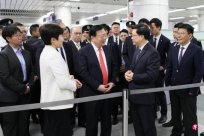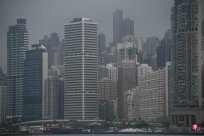After Hong Kong and mainland China cleared the customs last year, many Hong Kong people went north to consume every three forks.Ashamed, I went to Shenzhen again last week after two or three months.But because I haven't gone for a long time, I found a quite interesting phenomenon.
Remember that after leaving the country at Luohu Port, there were several tea restaurants around them, and there were some changing shops, telephone card shops and logistics companies.This time I saw at the gate that the flow of these shops was generally good. Instead, there were more than ten roast shops on the first floor of the port, which was a spectacle.
These roasting shops are sold for roast chicken, roast goose, roast duck, and roast suckling pigs. The price is similar to Hong Kong, about 100 yuan (S $ 19).However, through the glass window, all kinds of roasted flavors hanging inside are bright and good -looking, which has attracted many Hong Kong people to buy.
Some Hong Kong people chatted while queuing.Some people say that there are also one or two roasting stalls in Luohu Port before the epidemic. I tried to buy stomach pain after returning to Hong Kong. In recent years, the food hygiene of mainland China has improved, so I can buy it again.In contrast, the fresh chicken in the mainland is much more delicious, so I bought some home to enjoy.
Coincidentally, the next day I returned to Hong Kong, Hong Kong's largest food and fast consumer goods distributors, Dachanghang Group, announced that due to the uncertain external factors and various operating challenges, it was decided to terminate the food market.Business, close 28 food retail stores across its "Dachang Food Market" company.
"Darong Food Market" has a history of nearly 40 years in Hong Kong. There are 90 branches during the highest peak period. It is the premier frozen food company in Hong Kong. It has a great impact on the Hong Kong people's livelihood and is a collective memory of many Hong Kong people.After the "Dachang Food Market" announced the completion, it immediately aroused heated discussions in Hong Kong's society. Some media were reported in the next day and even in important layout.
Of course, in the past year, there have been many negative news related to the retail industry in Hong Kong."U -buy supermarkets" also announced a sharp reduction in the number of branches.In the eyes of some Hong Kong people, the "Dachang Food Market" graduation is not surprising.
The question is, after the end of the epidemic in Hong Kong's local retail industry for more than a year, why is the business still extremely deserted and there is no sign of recovery?
After the customs clearance of Lu and Hong Kong last year, Hong Kong quickly set off a wave of consumption in the north. Many Hong Kong people liked to travel to Shenzhen on weekends or holidays.People make a special trip to shopping.Hong Kong travel agencies even opened the "Sams" to snatched the business of some Hong Kong supermarkets and retail stores.
The data released by the Hong Kong Government Statistics Office previously confirmed this.Before the epidemic in January 2019, Hong Kong's retail industry sales reached 48.1 billion Hong Kong dollars (S $ 8.3 billion), but in January this year, it was only 36.5 billion Hong Kong dollars, which almost plummeted by 20 % within five years.
If compared with the supermarket type, the value of the sales value of Hong Kong supermarket goods in January this year also fell 9.3%year -on -year.Among them, fresh or refrigerated meat, fish, seafood foods, fruits and vegetables and frozen foods have fallen more than 10 %.The roast shop in Luohu Port rises, which can be explained to this phenomenon.
Many people travel to the country and see that there are some remaining local currencies when they see wallets, they often shop at the airport before leaving the country.Some businesses in Shenzhen are looking at this behavior model, and they have opened flavor shops at Luohu Port's gate, attracting Hong Kong people to return to Hong Kong for the last moment to "fight".Hong Kong people bought the flavor to go home and can eat it twice.No wonder the restaurants in the New Territories near Shenzhen have recently been bitter, telling the business that it is difficult to do.
In other words, the main force selling the "Dachang Food Market" of frozen meat, frozen foods, grain and oil groceries and seafood, and suddenly announced that closing all food retail stores is not only unexpected outside the outside world, and it is not surprising.From a deeper perspective, this also reflects that the integration of Lu and Hong Kong has a certain impact on the retail market in Hong Kong.
Guangdong and Hong Kong have been frequent in economic, trade and the people for many years.With the full customs clearance of the two places, the Hong Kong Government has made every effort to promote Hong Kong to actively integrate into the overall national development situation.In the past, Hong Kong's retail industry has great advantages, including many brand selection, rich types, and genuine guarantees; coupled with the exchange rate advantage brought by Hong Kong dollars, Hong Kong has become the "paradise" for mainland consumers to go out of the country.
But in recent years, the economic development of the mainland has increased rapidly.Some international luxury goods can also be bought in major cities in mainland China, and mainland tourists are no longer strange about many products in Hong Kong.Conversely, the mainland has continuously expanded to the outside world, and more and more daily products in imports, coupled with the improvement of the quality of mainland food and retail goods, have become increasingly attractive to Hong Kong people.
So with the "one -hour life circle" in the Guangdong -Hong Kong -Macao Greater Bay Area, the consumption of Hong Kong people in north has gradually become daily.The price of goods in the mainland is cheaper than Hong Kong, and it naturally set off a "reverse purchasing" trend in Hong Kong, bringing unprecedented pressure on the retail industry.
In recent years, Beijing officials have officially advocated the integration of the Guangdong -Hong Kong -Macao Greater Bay Area, and the construction of the Guangdong -Hong Kong -Macao Greater Bay Area has become China's national policy.The flow of people, flow, and logistics between Guangdong and Hong Kong are undoubtedly bringing huge benefits to this small place in Hong Kong.However, while the Guangdong -Hong Kong -Macao Greater Bay Area is deeply integrated, the Hong Kong retail industry may also need to keep pace with the times to maintain the status of Hong Kong's "shopping paradise".



